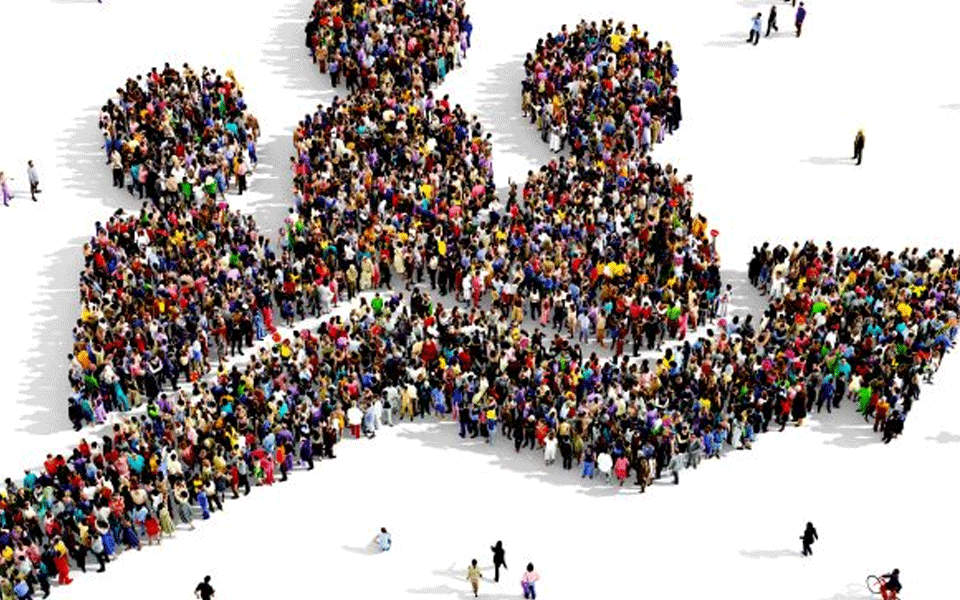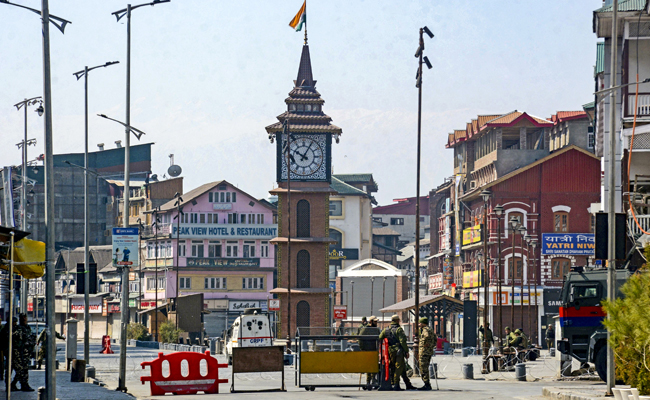United Nations, Jun 17: India, projected to surpass China as the world's most populous country around 2027, is expected to add nearly 273 million people between now and 2050 and will remain the most populated country through the end of the current century, a UN report said on Monday.
'The World Population Prospects 2019: Highlights', published by the Population Division of the UN Department of Economic and Social Affairs, said the world's population is expected to increase by two billion people in the next 30 years, from 7.7 billion currently to 9.7 billion in 2050.
The world's population could reach its peak around the end of the current century, at a level of nearly 11 billion, according to the study, which presents the main results of the 26th round of the UN's global population estimates, projections and global demographic patterns.
The new report released here said that more than half of the projected increase in the global population up to 2050 will be concentrated in just nine countries, led by India and followed by Nigeria, Pakistan, Democratic Republic of the Congo, Ethiopia, Tanzania, Indonesia, Egypt and the US.
The report highlighted that "disparate population growth rates among the world's largest countries will re-order their ranking by size.
India is projected to surpass China as the world's most populous country around 2027, according to current projections made in the report.
"India is expected to add nearly 273 million people between 2019 and 2050, while the population of Nigeria is projected to grow by 200 million. Together, these two countries could account for 23 per cent of the global population increase to 2050," the report said.
Previous UN projections had estimated that India will surpass China as the world's most populous country as early as 2022. The 2017 world population report, released by the UN two years ago, had estimated that the population of India will surpass that of China's by around 2024. In its 24th round of estimates released in 2015, the UN had projected that India will become more populous than China by 2022.
China, with 1.43 billion people in 2019, and India, with 1.37 billion, have long been the two most populous countries of the world, comprising 19 and 18 per cent, respectively, of the global total in 2019. They are followed by the United States of America, with 329 million in 2019, and Indonesia, with 271 million, the 2019 report said.
The report said that after this re-ordering between 2019 and 2050, the ranking of the five largest countries is projected to be preserved through the end of the century, when India could remain the world's most populous country with nearly 1.5 billion inhabitants, followed by China with just under 1.1 billion, Nigeria with 733 million, the US with 434 million, and Pakistan with 403 million inhabitants.
It further said that in 2019, around 40 per cent of the world's population lives in intermediate-fertility countries, where women have on average between 2.1 and four births over a lifetime.
Average lifetime fertility of 2.1 live births per woman is roughly the level required for populations with low mortality to have a growth rate of zero in the long run. Intermediate-fertility countries are found in many regions, with the largest being India, Indonesia, Pakistan, Mexico, the Philippines and Egypt.
The report also confirmed that the world's population is growing older due to increasing life expectancy and falling fertility levels, and that the number of countries experiencing a reduction in population size is growing.
By 2050, one in six people in the world will be over age 65 (16 per cent), up from one in 11 in 2019 (9 per cent). The number of persons aged 80 years or over is projected to triple, from 143 million in 2019 to 426 million in 2050.
Global fertility rate, which fell from 3.2 births per woman in 1990 to 2.5 in 2019, is projected to decline further to 2.2 in 2050. A fertility level of 2.1 births per woman is needed to ensure replacement of generations and avoid population decline over the long run in the absence of immigration.
UN Under-Secretary-General for Economic and Social Affairs Liu Zhenmin said the report offers a road map indicating where to target action and interventions.
"Many of the fastest growing populations are in the poorest countries, where population growth brings additional challenges in the effort to eradicate poverty, achieve greater equality, combat hunger and malnutrition and strengthen the coverage and quality of health and education systems to ensure that no one is left behind."
A growing number of countries are experiencing a reduction in population size. Since 2010, 27 countries or areas have experienced a reduction of one per cent or more in the size of their populations, caused by sustained low levels of fertility.
In China, the population is projected to decrease by 31.4 million, or around 2.2 per cent, between 2019 and 2050.
Further, life expectancy at birth for the world, which increased from 64.2 years in 1990 to 72.6 years in 2019, is expected to increase further to 77.1 years in 2050.
The report added that migration has become a major component of population change in some countries. Between 2010 and 2020, 14 countries or areas will see a net inflow of more than one million migrants, while 10 countries will see a net outflow of similar magnitude.
Let the Truth be known. If you read VB and like VB, please be a VB Supporter and Help us deliver the Truth to one and all.
Srinagar (PTI): Strict restrictions remained imposed in many areas of Kashmir for the third consecutive day on Wednesday following massive protests across the valley against the killing of Iran's Supreme leader Ayatollah Ali Khamenei, officials said.
As a precautionary measure, the government shut educational institutions till Saturday, while mobile internet speed continued to remain throttled.
"Restrictions on the movement and assembly of the people continued in many parts of Kashmir on Wednesday," the officials said.
They said strict restrictions were being enforced especially in the parts having large Shia population and those areas which have witnessed massive protests over the last three days.
A large number of police and paramilitary CRPF personnel were deployed across the city to prevent gatherings of protestors, the officials said.
ALSO READ: Family of five from Bengaluru killed in road accident in Andhra
They added that concertina wires and barricades were placed at important intersections leading into the city, while asserting that these were precautionary measures imposed to maintain law and order.
The iconic Ghanta Ghar in the city centre of Lal Chowk here continued to remain a no-go zone after the authorities sealed area with barricades erected all around it on late Sunday night.
The move to seal the Ghanta Ghar came after it witnessed massive protests on Sunday after Khamenei's assassination in the joint air strikes by the US and Israel.
This is the first time since August 2019 that protests on such a large scale have taken place in Kashmir.
The government had first ordered the closure of schools, colleges and universities for two days. However, on Tuesday it decided to close the educational institutions till Saturday as a precautionary measure in view of the protests.
Mobile internet speeds continued to remain throttled while some prepaid mobile connections were also barred, the officials added.
On Tuesday, protests rocked several places in the valley, including Sumbal and Pattan areas of North Kashmir.
In Sumbal of Bandipora district, security forces had to resort to force to disperse the demonstrators.
Some media outlets and individuals, including National Conference Lok Sabha MP from Srinagar Aga Syed Ruhullah Mehdi, and former Srinagar mayor Junaid Azim Mattu, faced police heat for allegedly circulating misleading information.
A case was filed against Mehdi and Mattu under BNS sections 197(1)(d) and 353(1)(b) at Cyber Police Station, Srinagar, for allegedly circulating "false, fabricated and misleading content" on digital and social media platforms.
"The content in question, prima facie, reflects the dissemination of distorted narratives and unverified information capable of causing public unrest and societal disharmony. Such deliberate attempts to spread misinformation pose a serious threat to peace, security, and overall stability," the police said in a statement.
Both have been condemning the killing of Khameinei and the attacks by the US and Israel on Iran.
However, hours after the registration of the case, Mehdi, an influential Shia leader, said he would not be deterred from speaking the truth.
"The people of Srinagar did not elect their MP to recite government-approved condolences. They elected him to speak truth. That mandate does not expire with an FIR," he said in a post on X.
Police has issued an appeal to people to refrain from violence and provocation.
"We appeal to all sections of the society to exercise restraint and refrain from violence and provocation," it said.
Police said they will take strict legal action against instigators of violence and those involved in unlawful activities.
On Tuesday, Lieutenant Governor Manoj Sinha directed officials to be on high alert and chaired a meeting of top officials of the police and army here.
ALSO READ: Man held for molesting, extorting Rs 50,000 from schoolgirl in Thane
"Chaired a meeting of senior police & civil administration officials at the Police Control Room, Kashmir, to review the law and order situation. Directed the officers to remain on heightened alert and take all necessary measures to ensure public peace and tranquillity," Sinha said on X.
He appealed to the people and community leaders to maintain peace.
"I also appeal to the citizens and community leaders to uphold harmony and contribute to an atmosphere of calm and goodwill in society. Preserving peace and sustaining the progress of society is a shared responsibility that rests equally upon each one of us," he said.





